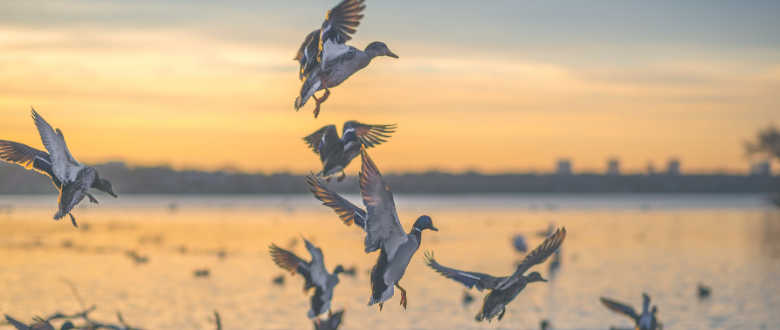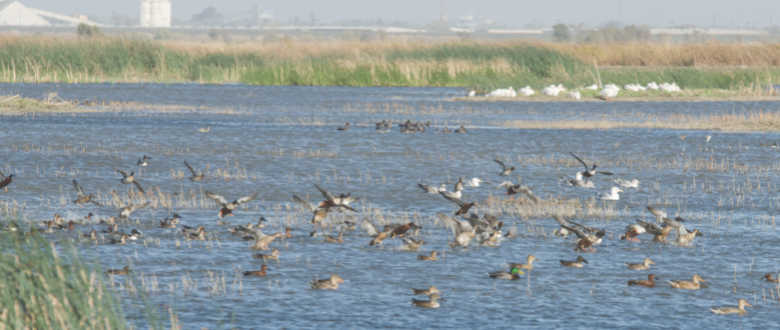Most ducks roost just before sunset, which in the fall is around 6:35 PM.

One of the top questions we get is what time do ducks roost in the evening? The time ducks tend to head to roost can vary depending on location and bird population, but here are some key facts about their nocturnal routines.
Ducks start heading to roost 30 minutes before sunset and continue until the end of civil twilight. During the fall months, such as November, sunset averages around 6:35 PM each evening. This results in a 50-minute window for which the birds filter into the roost.
Ducks roost on water and sleep during the night, roughly between the hours of 8:00 PM and 6:00 AM. The average duck will sleep about 8-10 hours during the night. They rarely move their roosts during the night, unless disturbed by predators. Many ducks will roost in the same spot for long periods of time – weeks or even months – before finding a different area to roost in.

Why do ducks roost at night?
As the sun begins to set, ducks will start to search for a suitable spot to roost for the evening. They prefer to roost in protected areas along lakes, rivers, ponds, and flooded flats. Ducks often choose an inundated area or island surrounded by water to provide a sense of safety and security. Ducks will continue to use the same roost unless disturbed or unfavorable changes occur.
But not just any water source will do. Ducks have a knack for selecting roosting sites with shallow pools out of the wind, which provides ample coverage from the elements and potential predators. They also prefer shallower water, which makes it easier for their webbed feet to grip the bottom as they settle in for the night.
Once a suitable roost has been found, ducks will begin to gather in groups, with like species congregating together when possible. As the sky grows darker, the ducks will huddle together for warmth and to offer mutual protection from any potential threats.
What time do ducks roost in the evening?
The time ducks choose to roost in the evening varies but usually starts 30 minutes before sunset and continues through civil twilight. On a typical fall day in November, sunset occurs around 6:35 PM. This means the window for ducks heading back to roost is between 6:05 PM and 6:55 PM.
A 50-minute window may not seem like much, but ducks are creatures of habit and will use the same roosts repeatedly. After leaving the roost during the day to forage and find suitable mates, they will gradually work their way back to the roost just before sunset.

What happens if a duck roost is disturbed?
Ducks are creatures of habit, and they will return to the same roosts each night for weeks or months at a time. Protected areas of open water that are conducive to roosting may not be abundant, making certain roosting areas even more vital in key hunting areas. If this habitat is destroyed or they are constantly disturbed at night, they may leave the area for good.
Ducks are agile birds and will quickly take flight if they sense any danger. They are also known to make loud noises, such as quacks and whistling, to alert the rest of the flock to potential threats.
Not disturbing a roost is the best way to ensure the birds leave well rested in the morning and continue their routine. This makes anticipating their movements easier so that you can set up for the hunt.
![]()
Bottom Line: Ducks Roost Just Before Sunset
While ducks may be most well-known for their distinctive appearance and behaviors during the day, they are also fascinating creatures when it comes to their roosting habits at night. They carefully select the waterbodies they roost in and gather in groups for safety and warmth.
Ducks head to roost just before sunset, which in the fall months tends to be around 6:35 PM. There’s a 50-minute window of the highest activity for birds retuning to the roost. They will spend the night loafing on the protected water of the roost, then head out to forage.
Was this helpful?
Search Chokes by Gauge
Latest Posts



